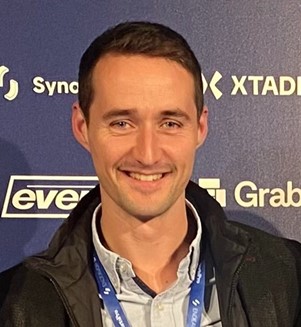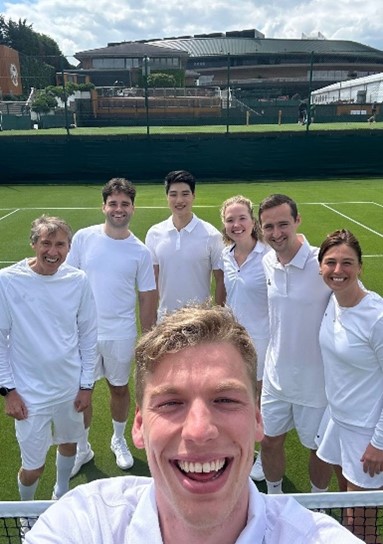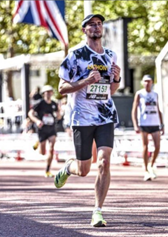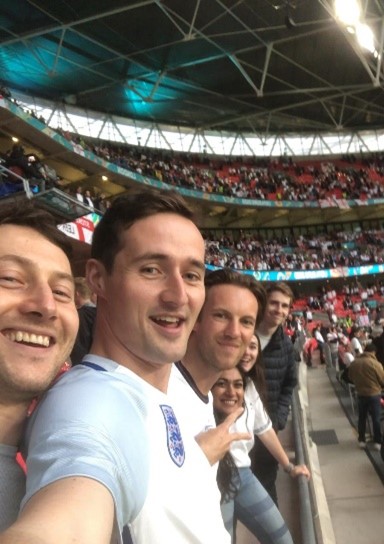Welcome to the ‘Meet the team’ series. To give you a glimpse of what it’s like to work at Futures, we’ve conducted a series of interviews with members of the team, across various levels of seniority and experience. Each person has been asked the same questions about their role, but have also answered a mix of questions on challenges they’ve faced, interview advice, the sports industry etc.

What is your current position and how long have you been with the business?
I’m a Group Director at Futures and have been with the business for almost 6 years (joined as a Senior Analyst in September 2018 after spending 3 years at a management consultancy).
What are your current core responsibilities?
My time is split roughly in half between client work and business operations. Having started out working across each of our core services on some of our major accounts such as Manchester United and ECB, in recent years I have focussed on developing and delivering our Consumer Research service. I lead our research work with adidas and FutureBrand and also manage our in-house research function (the MLTs).
Outside of client work, I support across a number of internal initiatives, including recruitment, marketing, learning & development and new business. Learning & development is a particular interest area of mine and one that I’m glad to see has been embraced by the business. When I started with the business formal training was a rarity, but this wasn’t a particularly big issue as there was only 8 of us in the team and we were in the office 5 days a week, so it was very easy to learn from (and annoy) each other! However, since we’ve grown and introduced our flexible working policy, our structured learning program has been great at ensuring everyone gets to learn a wide range of skills and we get to spend more time together as a group.
What are some of your biggest highlights in your time at Futures?
From a work perspective, it has been rewarding to work with my main client adidas for such a long period of time and to be able to see how our work has been embraced by the business and led to things that I’m able to proudly tell my family and friends I contributed to. For example, things like the move towards the snazzy design of 3rd kits or picking Bellingham to be the new face of the Predator franchise. Being able to travel to Germany and visit them at their Herzo base is a trip I look forward to each year, not just because it often works out conveniently for buying Christmas presents in the shop!
From a business perspective, I have massively appreciated the opportunity to help shape the UK office. With the company being so small and growing at pace, it is easier to be nimble and change the ways we do things. I have contributed to the ways we resource projects, the ways we recruit people to the team, the ways we upskill people (including forming the graduate programme) and the ways we reward our employees, amongst many other things! It is great to be part of a business where you feel like your voice is listened to and they are not afraid of change.
From a personal perspective, it would be amiss of me not to mention the experiences I have been very fortunate to receive in my 6 years here. Some highlights include several games in hospitality at Old Trafford, 3 Euros games across 2 tournaments (including a semi-final!), the 2022 Super Bowl in LA, a place in the London Marathon and playing at Wimbledon.



Do you have any advice for applicants?
Embrace being a sports nerd. It would be fair to say that there is a range of skills and experiences across the team at Futures. Some people that love to code and work on the analysis, others that are interested in the presentation aspect and building relationships with clients. But something we all have in common is our love for sport. We watch sport all day, talk about sport all day and spend lots of our free time playing sport. If you’re interviewing at Futures, we want to know about those things. We want to know that you’re reading every sports business article on the Athletic. Or that you’ve built your own model to build the perfect IPL team. Or that you manually capture cricket stats because you don’t like the way Sky does it. Being this into sport massively helps us service our clients, it helps you understand why numbers are up and down and allows you to talk with authority when recommending ideas.
How do you think the sports industry will change over the coming years?
Let’s keep this brief and focus on one trend in the industry and give it a Futures focus. AI is obviously all the rage, and while it does some cool things I’m not sure we’ve seen many effective applications of it yet. But I think it’s only a matter of time before we start to see it used more effectively in the sports industry. At Futures we’re looking at ways of embracing it within our research methodologies by asking personalised questions to respondents to gain a deeper understanding of their opinions, but also within our exposure monitoring process – using AI to help us train models that go through footage and work out which brands are seen and where. It’s great having an in-house technology team at Futures as they have their fingers on the pulse and are much more aware of what might be possible than I am!